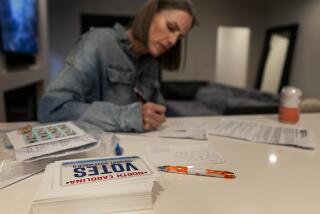Looking to the Next Election Day
On the day after the election, the smartest politicians are already planning for the next election.
Let others celebrate or mourn Tuesday’s results. The real pros know that politics is a continuing process. For them, Tuesday was just preparation for the campaigns to come.
I saw the process at work on Sunday when I talked to Juanita Tate, a leader of Concerned Citizens of South Central Los Angeles, a grass-roots political group in the the black community. The organization is best known for its role in stopping the city from building a huge trash-burning plant in a poor, working-class area of South L.A.
In killing the Lancer incinerator, Concerned Citizens outfought the project’s main backer, 9th District City Councilman Gilbert Lindsay. The group did it by door-to-door community organization, which tapped a deep environmental concern in the area. That success made Concerned Citizens a valuable part of Vote ‘90, a coalition formed by advocates for peace, immigrant rights, the environment, the homeless, working mothers, gays and lesbians, the disabled, seniors and organized labor. This liberal coalition, under different names, has been running get-out-the vote operations in Los Angeles since 1984.
Sunday, Tate was preparing for the organization’s Election Day drive, which promoted several state and local propositions, including “Big Green,” the tough environmental measure, and the “nickel-a-drink” alcohol tax proposal.
But like all smart politicians, Tate was also thinking of the election ahead. It wouldn’t be just another election. For if it comes off, it will be intertwined with the fate of the 89-year-old Lindsay, hospitalized since September with a crippling stroke.
“The community’s all buzzing about the Lindsay situation,” Tate said. She’d like Lindsay to resign--if he’s capable of it--or to have the council force him out and call an election for next April. “Democracy has broken down in the 9th District,” she said. Concerned Citizens hasn’t picked a candidate, but wants someone who is pro-environment and pledged to the economic revival of South L.A., Tate said.
As it turned out, the work that the Concerned Citizens did for Vote ’90 this fall was perfect preparation for replacing Lindsay.
In July, Tate attended a series of Vote ’90 training and organizing sessions for the canvassers. With the others, she was given lists of potentially liberal voters who only occasionally make it to the polls. The object was to get them to vote in November.
Armed with her voter lists, printed material and instructions from Vote ’90 headquarters, Tate began canvassing her neighbors. Her roots are here, in a neighborhood where her grandfather lived. Tate had moved to Philadelphia, where she worked for the phone company for many years. She came back to South L.A. in 1984 when she was offered a job as an administrator with the phone company’s huge Olympics operation. Tate, an energetic woman of 52 whose hair is turning gray, recently retired and is living in an apartment house on the family property. Other family members live in the apartment and when I visited, it was like one big, friendly open house.
Canvassing’s not as easy as it was when the neighborhood was heavily black. “The 9th District is now 52% African-American and 46% Latino, and of the Latinos, 33% are undocumented,” she said. Sometimes, it’s a tense ethnic mixture. “Their kids have a birthday, they celebrate all day and night,” she said. “A neighbor has chickens and at 3:30, the rooster crows. The man across the street, he has geese.”
But she says they work out their differences. “We’re able to deal with the loud parties,” she said. “After 10 p.m., they keep it down.”
Relationships are established by such compromises. That helped her talk to her neighbors about the ballot measures. “I told them Big Green is important to South Central,” she said. “We have the highest infant mortality rate. There’s junk all over, plating companies, oil processing companies.”
This person-to-person contact may seem old-fashioned in a day of television politics. But Vote ’90 study of the 1988 election showed that turnout increased by about 4% in precincts where there were strong get-out-the vote operations. Such numbers are particularly important in low-turnout local elections, said Larry Frank of Vote ’90. “The best field operation will often win an election in a local race,” he said. “Media efforts may be prohibitively expensive and the pool of voters small.”
Tate recalls that Lindsay received only 9,088 votes in his last reelection. With such a low turnout possible next time, Tate knows every call she made for Big Green this fall may be a vote next spring for a new council member.
More to Read
Get the L.A. Times Politics newsletter
Deeply reported insights into legislation, politics and policy from Sacramento, Washington and beyond. In your inbox three times per week.
You may occasionally receive promotional content from the Los Angeles Times.










